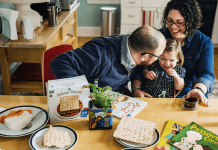My husband and I have walked into my late mother-in-law’s house for the last time.
We are in the process of settling her estate, including the sale of her house and disposition of everything in it.
From a hutch filled with china and crystal goblets to overflowing jewelry boxes and coin collections. And everything in between.
A lot in between.
Her clothes. The Notre Dame sweaters my late father-in-law was so fond of wearing. Her furniture. Furniture inherited from her mother-in-law, still in the same place in the garage where it was originally placed 30 some-odd years ago. My husband’s Cub Scout uniform. Christmas decorations. Lots and lots of Christmas decorations.
Every room, every closet, every shelf, every drawer. Full of stuff. A lifetime of stuff. Two lifetimes, if you count my father-in-law, who passed away 11 years ago.
What to Do With a Lifetime of Stuff
My mother-in-law was a neat and tidy housekeeper. But like many of us (myself included), she lived in a good-sized house with plenty of room to accommodate stuff. Things inherited from her parents and her in-laws. The broken vacuum cleaner waiting for repair in the back of the closet. Hundreds of books read once. You get the picture.
And the cost of disposing of all of that stuff? Having the estate sale company we hired go through every room, every closet, every drawer, separating the trash from the treasures, may cost more than will be generated at the eventual estate sale.
Her house has been transformed into a store, the estate sale company having cleverly arranged and displayed my mother-in-law’s possessions on tables in every room.
All of her possessions with any value, save the very few we kept, each with a tiny white price tag.
Losing your last surviving parent is hard enough. But being the arbiter of which of your parents’ and grandparents’ treasures get saved and which end up sold, donated, or in a landfill? gut-wrenching.
The lesson we have learned from this experience?
Most of the stuff in your house is worthless. And eventually, someone, either you or your kids, will be tasked with the overwhelming job of getting rid of it.
Most of Your Stuff Is Worthless
Most of the stuff in your house is worthless.
Yes, even the stuff you worry the most about, the stuff you think is so good you don’t use it for fear of breaking it, has little to no resale value.
From china, china cabinets, crystal goblets, silver tea sets, pianos, and collectible figurines like Hummels, to grandfather clocks and real pieces of craftsmanship furniture.
Why? Baby boomers have glutted the market with their castoffs, and millennials, the next generation of buyers, don’t want it.
Millennials hate both formal in-home entertaining and use of second-hand goods. With looming student loans, they tend to rent and move often. Who wants to be constantly moving a piano and a grandfather clock from apartment to apartment?
And furniture? There’s no market for so-called “brown furniture,” meaning any furniture (regardless of quality) other than the “mid-century casual” furniture (think clean, lightweight) favored by millennials. Brown furniture is basically firewood.
If it’s not in great condition, it’s also not fit for donation because it can’t be resold.
All of my mother-in-law’s furniture (including the pieces inherited from her mother-in-law and kept for decades)? Straight to the landfill.
Well, Almost Everything…
What do guns, LPs (records), and precious metals/gems have in common?
They are 3 things you might have in your house with a robust resale value.
Silverware also has value, but only if it is real silver and can be melted down.
3 Things You Should Be Doing NOW to Reduce the Amount of Stuff You Have
1. Be viciously thoughtful about holding onto sentimental items.
Here was our goal with sorting through my mother-in-law’s things. Keep just enough to remind us of her, but not so much stuff that our daughters are going to be dealing with it 40 some-odd years from now.
Here’s what we kept:
- A painting to be displayed in our dining room
- My mother-in-law’s treasured Swarovski crystal animal collection (all of which were given to her by her children and grandchildren over the years)
- Jewelry to be divided among the granddaughters
- Each of our daughters got to select 1 item
And that was it.
Well, almost. We did set aside photos to be digitized (with the originals then destroyed).
Was it hard leaving everything else? You bet it was. But we don’t want to be dealing with a lot of stuff years from now (or worse, leaving it to our daughters to deal with).
I try to be viciously thoughtful with my own sentimental items. For example, I don’t save any school papers or art projects from my kids (though I do take photos of my favorites).
2. Buy fewer books.
While used book resellers like Half Price Books do an important service in keeping books in circulation, a surprising number of books end up in landfills because many paper recycling facilities can’t process the the glue that binds book spines.
My resolution last year was to cut down on my book consumption by only reading books that I borrow from the library or purchase on my Kindle e-reader. If you haven’t used a library in years, now is the time to go back. My local library has an app where you can “order” books online, and pick them up the next day on a special “hold” shelf strategically placed next to the check-out kiosk.
How successful was I on my resolution? I read 1 to 2 books a week in 2019, only 1 of which was a hard copy purchased from Amazon.
3. Buy fewer, but better quality, clothes
The world is overflowing with used clothing.
We buy substantially more clothing over our lifetimes than our grandparents did.
Clothing made today is meant to last no more than a few years. In fact, a lot of clothing isn’t even made to withstand more than a few washes.
Think you are “paying it forward” but dropping off a load of unwanted clothes at Goodwill? Think again. Most clothing donations never make it to the racks at Goodwill and only about a third of what does eventually sells.
To really pay it forward, cut down on the amount of clothing you have by buying better quality clothes that last longer.
Keeping What Really Matters
My 5-year-old chose to keep a Christmas music box from her Grandma’s house. It plays “White Christmas” and has tiny ice skaters going around a rink inside. Each Christmas, my mother-in-law would bring out this music box and let each of her granddaughter’s play with it. It’s value in preserving a precious memory of Grandma? Priceless.














Wow, sounds like you’ve never worked with legitimate estate companies, who are set up to actually deal with all of the “stuff” you apparently discarded, instead of generating surprising amounts of money. In your case, for your family, but your paying clients would certainly benefit from professionals, in their field(s). Dealing with a good estate sale company, could actually generate dollars for your clients, instead of letting you chunk their items.
I wouldn’t choose to be my own lawyer, because I know I’m not qualified. It’s nice that there are attorneys who actually acknowledge that estate sales are totally out of their line of “expertise “, and have a legitimate company do that service.
My estate sale company has been in business for 25 years now, and we have a stellar reputation.
And what of the X-Geners? Just not enough of us? Did you forget about us and our buying power or just figure they didn’t buy, sell or exist enough to impact their millennial children. Lest you forget the Millenials and Zgen will be cleaning out XGen houses when we die.
I am 82 years old and find it very sad that this generation is so disposable.
I agree with getting rid if clothes,books etc. I look at stuff and say” the kids will junk this”. I have a hard time with some old furniture that was built so well. And still in great shape.
I label some of my things With Name and Date only China, painting, etc.
I also took old gold and made it into bracelets which I. Wear and easy to pass on
I give each Grand child when they get married a precious piece to remind them of their Grandpa and Gramma and tell them a story behind it
The only thing that really matters are the memories and I try to keep them alive .
Remember to talk about your history. All to soon it is gone ⏳⌛️??
I’ve started…sort of. I have first of all taken plastic bins and packed them with family heirlooms I would like kept in the family, labeled the items packed inside, and assigned one for each of my grandchildren. Any old clothes that are starting to wear out go in the trash. The cedar chest my grandfather made for my grandmother…if no one wants it, bury it with my ashes inside.
I truly believe at some time in the future all of that “stuff” will be missed and wanted. It seems as if memory of certain pieces are thrown out the window along brown furniture. I still use my Mother’s goblets remembering her and my Grandmother’s artwork. It is not all the Baby Boomers fault!
After going through the stuff in my parents’ house, I have been trying to rid myself of stuff. I have told my children that I do not expect for them to be emotionally attached to any of our things. Sell them, donate them, burn them. But do not feel obligated to take stuff that you will not use and leave any guilt in my house on your departure.
remember that the people running the estate sale charge (a lot) for their time to sort all your junk. Better to weed out ahead of time. When going through my parent’s house I was surprised how much trouble it was to sell/donate things I thought valuable – a really large oriental rug, a gigantic china cabinet, sets of china, etc.
I am in the second hand business of furnishings. The trick I’ve learned is this: If you make those furnishings current, meaning re-style them in modern day fabrics or finishes, then Millennials LOVE IT. I have made a thriving business off of old cast offs, transforming them into desirable products and reselling them at a reasonable price tag to millennials. Although they don’t want tons of stuff, they do want quality and can’t always afford it. This way they can get what they want: Unique stuff their friends don’t have. Makes them feel special. They also want to save the planet in any way possible comparetively to other generations, thus most of my business comes from those wanting to reduce waste on the planet, of which millennials are the overwhelming purchasers of my goods. Gen X’ers come into my shop with heirloom items for me to transform and baby boomers rarely stop in. So I have hope for the future with how millennials treat conscious consumerism.
So, so true! Sad but true! K
Having cleaned out 2 grandparents` houses and 2 sets of parents` houses, and down sized our house, i can so relate to what you experienced. A few thoughts came to mind: 1. Your children will, maybe , want a few things but not much. 2. Those family pictures need to be labeled with names and relationships so maybe the future generations will make connections. I did this with my mother before she passed away and am so glad I did. I would not know half and my children possibly none. 3.clean out often and don’t hold onto things that you don’t use. I do have some brown furniture that I love, because of family connections but I won’t know if my children don’t. It’s ok if they don’t.